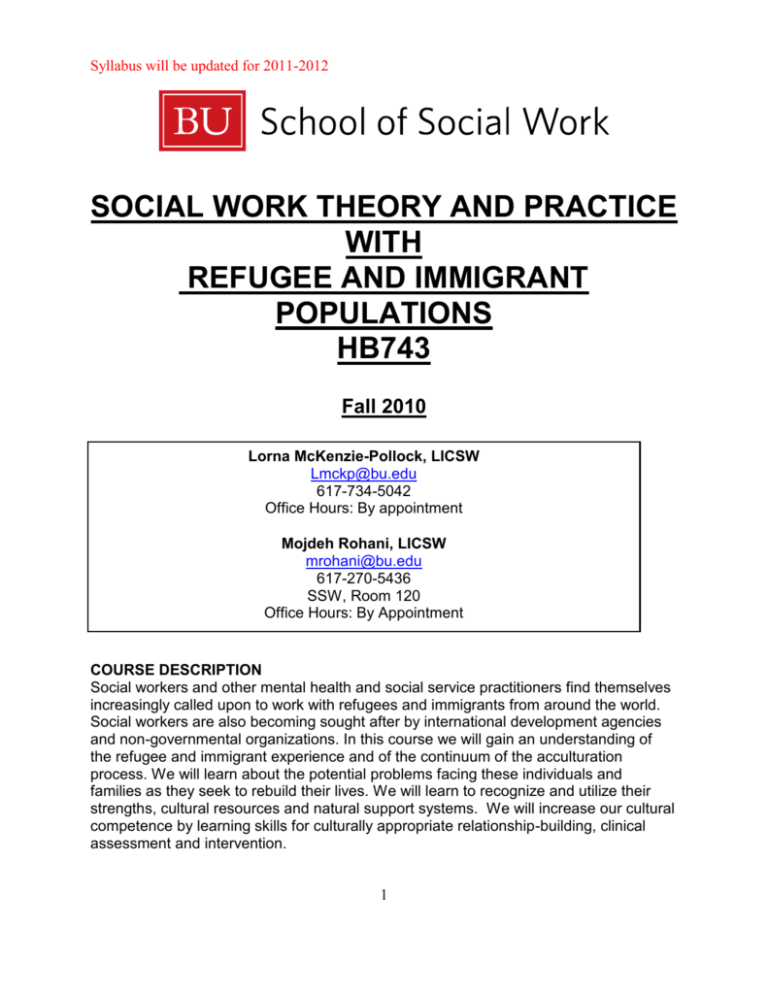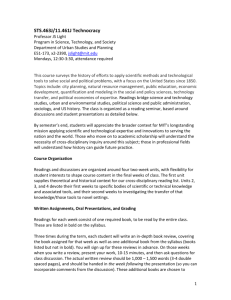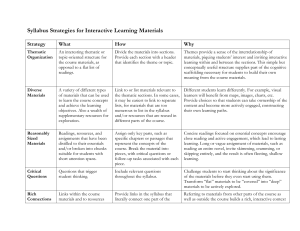
Syllabus will be updated for 2011-2012
SOCIAL WORK THEORY AND PRACTICE
WITH
REFUGEE AND IMMIGRANT
POPULATIONS
HB743
Fall 2010
Lorna McKenzie-Pollock, LICSW
Lmckp@bu.edu
617-734-5042
Office Hours: By appointment
COURSE DESCRIPTION
Mojdeh Rohani, LICSW
mrohani@bu.edu
617-270-5436
SSW, Room 120
Office Hours: By Appointment
COURSE DESCRIPTION
Office and
Address
Social workers and other mental health
social service practitioners find themselves
Work
Phone
# immigrants from around the world.
increasingly called upon to work with refugees and
Office
Hours
and/or
statement
of
accessibility
outsidedevelopment
of class
Social workers are also becoming sought after by international
agencies
and non-governmental organizations. In this course we will gain an understanding of
the refugee and immigrant experience and of the continuum of the acculturation
process. We will learn about the potential problems facing these individuals and
families as they seek to rebuild their lives. We will learn to recognize and utilize their
strengths, cultural resources and natural support systems. We will increase our cultural
competence by learning skills for culturally appropriate relationship-building, clinical
assessment and intervention.
1
Syllabus will be updated for 2011-2012
COURSE OBJECTIVES
By the end of the course, students will be familiar with:
1.
2.
3.
4.
5.
6.
7.
8.
The global context of migration and the forces underlying migration.
Current U.S. immigration policies.
Acculturation theory.
Integration of a multicultural perspective in engagement, assessment, and
intervention.
Key clinical/community issues of trauma, family violence and substance abuse.
An overview of practice with selected newcomer populations.
Current research on practice with refugees and immigrants.
Career opportunities in refugee and immigrant work.
TEXT & READINGS
There are two texts for the course:
Delgado, M., Jones, K., & Rohani, M. (2004). Social work practice with refugee and
immigrant youth in the United States. Boston: Allyn and Bacon.
McGoldrick, M., Giordano, J., & Garcia-Preto, N. (Eds.) (2005). Ethnicity and family
Therapy (3rd ed.). New York: Guilford Press.
Some readings for the course are on-line through Mugar library at http://library.bu.edu.
Additional articles and video material are available on the Blackboard 8 website.
COURSE OUTLINE
9/9 Session 1 Introduction, course objectives, current immigration issues.
Discussion of film. (Lorna)
Required reading:
The truth about immigrants in Massachusetts, MIRA Bulletin
9/16 Session 2 Migration within a global context. Refugees and immigrants in the
U.S: Key concepts and perspectives. Overview of services. (Mojdeh)
Required readings:
Acer, E. (2002). Living up to America's values: Reforming the U.S. detention system for
asylum seekers. Refuge, 20(3), 44-57.
Delgado, Jones and Rohani, Chapters 2 and 3.
2
Syllabus will be updated for 2011-2012
Massey, D., Arango, J., Hugo, G., Kouaouci, A., Pellegrino, A., & Taylor, J. (2004).
Theories of international migration: A review and appraisal. In M. Mobasher & M.
Sadri (Eds.), Migration, globalization and ethnic relations: An interdisciplinary
approach. NJ: Pearson Prentice Hall.
9/23
Session 3 Families and children. Role reversal, children of war. (Mojdeh)
Required readings:
Beah, I. (2007, January 14). The making and unmaking of a child soldier. The New
York Times Magazine.
Llerena-Quinn, R., & Pravder Mirkin M. (2005). Immigrant mothers: Mothering in the
borderlands. In M. Mirkin, K. Suyemoto, & B. Okun (Eds.), Psychotherapy with
women (pp. 87-110). New York: Guilford.
Morton, A. (2002). Children asylum seekers face challenges in the United States.
Refuge, 20(2), 13-20.
Pine, B. A., & Drachman, D. (2005). Effective child welfare practice with immigrant and
refugee children and their families. Child Welfare, 84(5), 537-562.
9/30 Session 4 Treatment issues and approaches. Trauma, loss, depression and
intergenerational conflict. Culture dependent symptoms: Cultural strengths and
resources. Treatment of trauma across cultures. Natural support systems and
traditional healers. Individual, family and community focus. (Mojdeh)
Required readings:
Falicov, C. (1998). The cultural meaning of family triangles. In M. McGoldrick (Ed.)
Revisioning family therapy (pp. 37-61). New York: Guilford.
Herman, J. (1992). Terror. In Trauma and recovery (pp. 33-50). New York: Basic
Books.
Kinzie, D. (2001). Psychotherapy for massively traumatized refugees. American Journal
of Psychotherapy, 53(4), 475-490.
Sussman, L. (2008). The role of culture in illness interpretations and therapy. In U.
Gielen, J. Draguns, & J. Fish (Eds.), Principles of multicultural counseling and
therapy. New York: Routledge.
3
Syllabus will be updated for 2011-2012
10/7 Session 5 Introduction to ethnographic theory: the concept of Participant
Observation. Issues in multicultural practice. Providing linguistic access. The triadic
model. (Lorna)
Required readings:
Gmelch, G. (2006). Lessons from the field. In J. Spradley & D. McCirdy (Eds.),
Conformity and conflict: Readings in cultural anthropology (12th ed., pp. 46-57).
Boston: Pearson.
Lee, E. (1997). Cross-cultural communication: Therapeutic use of interpreters. In
E. Lee (Ed.), Working with Asian-Americans (pp. 477-489). New York: Guilford
Press.
Spradley, J. (2006). Ethnography and culture. In J. Spradley & D. McCirdy (Eds.),
Conformity and conflict: Readings in cultural anthropology (12th ed. pp. 7-14).
Boston: Pearson.
10/14 Session 6 Social work practice with African newcomers. Film: Rain in a Dry
Land. Discussion and guest speaker. (Lorna)
Required readings:
Bangirana, P., Johnson, L., Kizito, S., & Mayanja, M. (2009). Contrasting concepts of
depression in Uganda: Implications for service delivery in a multicultural context.
American Journal of Orthopsychiatry, 79(2), 275–289.
Black, L. & Jackson, V. (2005). Families of African origin: An overview. In M.
McGoldrick et al., pp. 6-16.
Gordon (2004). The new diaspora: African immigration to the United States. In M.
Mobasher & M. Sadri (Eds.), Migration, globalization and ethnic relations: An
interdisciplinary approach. NJ: Pearson Prentice Hall.
10/21 Session 7 Social work practice with Asian newcomers. (Lorna)
Required readings:
Kinzie, D. (2001). Psychotherapy for massively traumatized refugees. American Journal
of Psychotherapy, 53(4), 475-490.
McKenzie-Pollock, L. (1996). Cambodian families. In M. McGoldrick, J. Pearce, & J.
Giordano (Eds.), Ethnicity and family therapy (2nd ed., pp. 290-301). New York:
Guilford.
4
Syllabus will be updated for 2011-2012
Ross-Sheriff, F., & Chaudhuri, S. (2004). Asian Indian children and families. In R. Fong
(Ed.), Culturally competent practice with immigrant and refugee children and families
(pp. 146-162). New York: Guilford Press.
10/28 Session 8 Empowerment and community organizing in newcomer
communities. (Lee Staples)
Required reading:
Fred, S. (2005). Building an international field of practice. NASW News, 50(4).
11/4 Session 9 Social work with Latino & Central American newcomers. Luz Lopez
Required readings:
Falicov, C. (2005). Mexican families. In McGoldrick et al.
Garcia-Preto, N. (2005). Latino families. In McGoldrick et al.
Garcia-Preto, N. (2005). Puerto Rican families. In McGoldrick et al.
11/11 Session 10 Substance abuse and family violence. Child abuse within the
cultural context. Domestic violence within the cultural context. Additional factors in
violence in newcomer communities. Resources and treatment approaches. (Lorna and
Mojdeh)
.
Required readings:
Acevedo, M. J. (2000). Battered immigrant Mexican women's perspectives regarding
abuse and help-seeking. Journal of Multicultural Social Work, 8(3/4), 243-282.
Kulwicki, A. D. (1999). Domestic violence in the Arab-American population:
Transforming environmental conditions through community education. Issues in
Mental Health Nursing, 20, 199-215.
Raj, A., & Silverman, J. (2002). Violence against immigrant women: The roles of
culture, context, and legal immigrant status on intimate partner violence. Violence
Against Women, 8(3), 367-398.
11/18 Session 11 Social work practice with Arab and Middle Eastern newcomers.
(Lorna and Mojdeh)
Required readings:
5
Syllabus will be updated for 2011-2012
Abudadabbeh, N. (2005). Arab families: An overview. In McGoldrick et al.
MacFarquhar, N. (2002, April 16). For Palestinian refugees, dream of return endures.
The New York Times.
And either or both of the following:
Jalali, B. (2005). Iranian families. In McGoldrick et al.
Haboush, K. (2005). Lebanese and Syrian families. In McGoldrick et. al.
11/25 No class. Happy Thanksgiving!
12/2 Session 12 Student presentations. (Lorna and Mojdeh) second paper due
12/9 Session 13 Spirituality. (Lorna and Mojdeh) Student presentations.
Required readings:
Kamya, H. (2008). Healing from refugee trauma: The significance of spiritual beliefs,
faith community, and faith-based services. In Spiritual resources in family therapy
(2nd ed., pp. 286-300). New York: Guilford Press.
Piwowarczyk, L. (2005). Engaging the sacred in treatment. Torture, 15(1).
12/16 Session 14 Student presentations continued. Wrap up and course evaluation.
(Lorna and Mojdeh)
Required reading:
Martin, S. (2004). Refugee women (2nd ed., pp. 147-158). Lanham, MD: Lexington
Books.
ASSIGNMENTS
THERE ARE TWO WRITTEN ASSIGNMENTS AND A CLASS PRESENTATION
Assignment options will be discussed in the early class sessions.
A. Case Analysis or Macro-Focused Assignment - Due Session 6
Option #1 Case Analysis
(7-8 pages, with minimum of four references)
6
Syllabus will be updated for 2011-2012
Select a current or recent case where client or significant family member is a refugee or
immigrant. Briefly summarize the central issues in your work with this individual/family
(include a culturagram, and a genogram in appendix). Discuss case in terms of:
a. Cultural background: Key values/beliefs, gender roles, religion, concepts of
health/mental health, help-seeking behaviors.
b. Relevant pre-migration history: Family composition, geographic location, occupation, class,
education.
c. Migration experience: Reasons for migration, decision-making process, timing of
departure, nature of departure (i.e. dangerous escape, years in refugee camp, direct
flight to U.S., etc.), significant losses/trauma.
d. Adaptation and acculturation processes: Duration, difficulties, different stages within
family system, role changes and environmental stressors
e. Strengths and resources within individual client, family, culture, and community.
f. Self-observations about your working relationship with client: Comfort level, degree
to which cultural differences/client’s migration experience/acculturation level are
addressed; degree to which these presented challenges or impacted your work
Reflect on what you learned from your work with this client or family.
Option #2 - Macro-Focused Assignment
Macro students are encouraged to discuss ideas and guidelines for this assignment
with the instructors. Initial possibilities include (but are not limited to):
a. Assessment of a program/service delivery model in terms of effectiveness and
cultural competency for a specific newcomer group.
b. Analysis of recent immigration policies and impact on newcomers and agencies
serving them.
c. Planning and implementation of newcomer-related activity at placement; discussion
of process and outcomes.
B. Personal Journey of Cultural Exploration - Due Session 12
(12-14 pages, with minimum of six references)
Select a newcomer community with which you are relatively unfamiliar. Discuss the
following:
a. Historical contexts of group: A brief summary of key events, such as colonization,
migration, oppression, economic factors.
b. Core cultural values and family patterns such as belief systems, sense of self, family
structure and roles.
c. Current issues in the community: Concerns regarding public policies, availability and
accessibility of services, acculturation issues, legal status concerns, substance
abuse, family issues.
7
Syllabus will be updated for 2011-2012
d. Strengths and resources in culture and community.
e. Your “hands-on” learning experience: MINIMUM of two interviews with key
respondents (formal/informal community leaders, bicultural human service
providers/community organizers, staff at ethnic specific agencies). Please discuss
prospective interviewees with instructors. They may also be able to suggest specific
contacts. Additional "hands-on" learning can be done through neighborhood walks,
visits to ethnic businesses, attending religious ceremonies or cultural events, or
media and artistic expressions.
f. Application of new knowledge: How can you use this new understanding in your field
placement and/or with clients, colleagues and in your personal life?
g. Self-observations during process: Your feelings/reactions while taking this "journey."
You will also be asked to give a class report on your findings.
COURSE GRADING CRITERIA
Class participation
25%
ST
1 paper
25%
Cultural Exploration paper
50%
COURSE POLICIES
Attendance:
As developing professional colleagues, students are expected to attend all class sessions
and participate actively, respectful of each other's contributions, of clients and client
confidentiality, and of the instructor and the shared process of learning. Students are
expected to inform the instructor in advance of any absences. Failure to attend class
sessions may have a negative effect on the student’s course grade.
Students should notify instructors by phone or e-mail of any impending absence,
indicating how they will obtain material from the missed session. Since the framework
for each class is established in the opening minutes of the session, it is important that
all participants arrive on time. A persistent pattern of unapproved lateness may affect
negatively a student’s course grade.
Academic honesty:
Papers and presentations in the School of Social Work must meet standards of
academic honesty and integrity, avoiding any possibility of plagiarism or other forms of
academic misconduct. For specific information about the BUSSW policy regarding
academic misconduct, see Student Handbook: Ways & Means
(http://www.bu.edu/ssw/current/stud_hb/index.shtml).
8
Syllabus will be updated for 2011-2012
Incomplete Grades:
A student who cannot complete the assignments for a course must initiate an
incomplete grade dialogue with the instructor before the final class. Individual
instructors can refuse to grant a grade of Incomplete.
The Incomplete Grade Contract can be found at:
http://www.bu.edu/ssw/current/academic/registration/documents/IncompleteGradeContr
act2010.pdf
A student who does not submit to the Registrar a negotiated Incomplete Grade
Contract with the instructor will receive a grade of F for the course. Students must
resolve incomplete grades by the agreed upon contract date. An incomplete grade will
be changed to a grade of F by the instructor if the student fails to complete work by
contract date. A student must successfully complete a pre-requisite course to continue
in the next course in the sequence.
Students with disabilities:
If you have a disability and want to request reasonable accommodation, the University
requires that you consult with Boston University’s Office of Disability Services for
information regarding this process.
Writing style and references:
Students are expected to follow the editorial and reference standards set out in the
Publication Manual of the American Psychological Association (2010). This manual is
available at the Mugar Library reference desk. A helpful BUSSW APA Style Guide can
be found at http://www.bu.edu/ssw/current/academic/index.shtml.
Academic writing assistance:
If you would like academic writing assistance, information can be found at
http://www.bu.edu/ssw/current/academic/assistance/index.shtml or contact the BUSSW
Office of Student Services.
Electronic devices in the classroom:
Computers may be used to support the learning activities in the classroom, with
permission of your instructor. These include such activities as taking notes and
accessing course readings under discussion. However, non-academic use of laptops
and other devices are distracting and seriously disrupt the learning process for
everyone. Neither computers nor other electronic devices are to be used in the
classroom for non-academic reasons. This includes e-mailing, texting, social
networking, and use of the Internet. The use of cell phones during class time is
prohibited. Please turn off cell phones and refrain from taking calls unless you are “on
call” and have cleared this with the instructor prior to class.
Under such circumstances, please put your phone on vibrate, sit close to a door, and
step out of the room to take the call.
9
Syllabus will be updated for 2011-2012
Audiotaping of classes:
A Massachusetts statute, MGL c. 272 section 99, prohibits the taping of any oral
communication without notice to all parties involved. It is important, therefore, that any
taping of classroom proceedings (e.g., for the benefit of absent students or as a study
aid to all students) occur only with effective prior notice to all.
Class lectures at BUSSW are not routinely audiotaped, but occasionally a student or
faculty member may wish to do so. In the event that a specific class session is to be
taped (e.g., for a student who will be absent for that session), the faculty member
should notify students at the beginning of the class that the session will be taped. If a
course will be audiotaped throughout the semester (e.g., as an academic
accommodation for a student with a documented disability or for other educational
purposes) the faculty member will inform students (in the course syllabus or in a written
communication) that the class lectures will be taped.
Religious holidays:
The school, in scheduling classes on religious holiday, intends that students observing
those holidays be given ample opportunity to make up work. Faculty members who wish
to observe religious holidays will arrange for another faculty member to meet their
classes or for canceled classes to be rescheduled.
Other course policies:
Class Participation
Students are expected to participate actively in class, and in a manner that is respectful of
each other's contributions, of clients and client confidentiality, and of the instructor and the
shared learning process. Full participation creates an effective learning environment. We
expect that each student will contribute to the in-class learning experience by actively
listening, speaking, and sometimes leading class discussions. Each student is a learning
resource for other students and faculty. The common foundation for discussion rests with
the readings. We believe that both verbal and written skills are important to social workers.
You will have the opportunity to participate in small groups as well as in larger class
discussions. Class participation counts for 20% of your grade and is evaluated on the
following criteria: attendance, level of preparation demonstrated in oral questions and
comments in small and large group discussions, and quality of written responses to inclass exercises.
Late Assignments
It is your responsibility to submit assignments on time. If you are unable to submit an
assignment by the date and time indicated on this syllabus, you must inform me at least
10
Syllabus will be updated for 2011-2012
48 hours prior to the time the assignment is due. If you submit an assignment after the
due date and time without informing me, 10% of the total assignment point value will be
deducted automatically. For example, if an assignment is worth 25 points, 2.5 points will
be deducted prior to grading. Another 10% of the total grade will be deducted for each
additional week, or fraction thereof, that the assignment is late. You can avoid the late
deduction(s) by planning ahead and contacting me to make alternative arrangements.
Confidentiality
Federal health regulations of 2003 mandate the protection of client confidentiality
by changing the name of the client, significant others, agency, conditions, other
descriptors, and geographic locations that could lead to client identification.
11








